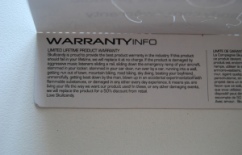 A contractor client asked me to explain to him what it meant when someone told him that he had given implied warranties to an owner. This is an excellent question.
A contractor client asked me to explain to him what it meant when someone told him that he had given implied warranties to an owner. This is an excellent question.
Implied warranties are warranties that the law presumes you have given to the other party. Even if you never make any written warranty or guaranty, North Carolina courts will often find that you are still liable for certain warranties unless you explicitly disclaim them.
The warranties that are generally implied in construction contracts include:
- Warranty of Merchantability
- Warranty of Fitness for a Particular Purpose
- Warranty of Habitability (residential construction only)
- Warranty of Plans and Specifications
- Warranty of Workmanship
- Warranty to not delay or hinder any other parties on the Project
What do these warranties mean? Essentially, they all mean the same thing: that your product or labor is at least acceptable. It may not be perfect—but it meets certain minimum expectations.
Disclaimable Warranties
Warranty of Merchantability—Under the Uniform Commercial Code, this warranty states that the merchant or supplier of a product delivered to the buyer warrant that the product is able to be used as intended.
Warranty of Fitness for a Particular Purpose—This warranty, also under the Uniform Commercial Code, states that a product will be able to be used for a specific purpose which the buyer has told you about. It is usually less of an issue that merchantability—however, if a buyer tells you of an unusual need that he is expects the product you supply to him will meet, it can come into play.
Both of these warranties can be disclaimed—that is, you can assert that you are making no such warranties in your written contract or purchase order form. Certain requirements apply to make a disclaimer valid, so check with legal counsel.
Nondisclaimable Warranties
The remaining warranties—Habitability, Plans and Specifications, Workmanship, and Not to Hinder or Delay—are warranties that, in general, cannot be disclaimed.
Warranty of Habitability– The contractor for new residential construction owes a duty to build a house (and related fixtures) such that it can be lived in for normal residential purposes. This duty extends to both the original purchaser and subsequent purchasers, so long as statute of limitation and repose are met.
Warranty of Plans and Specifications–The owner impliedly warrants to the contractor that the plans and specifications provided to the contractor are adequate. This is also called the “Spearin doctrine.”
Warranty of Workmanship—Every contractor impliedly warrants that his construction will be built in a workmanlike manner and sufficiently free of major defects. This implied warranty is sometimes made express in written contracts—such as in AIA A201 3.5.1.
Warranty to Not Delay or Hinder—This warranty is owed by each contractor to his subcontractors, prime contractors to one another, and the owner to the contractor.
If a warranty is breached, the other party has a claim for breach of the implied warranty at issue.
 Have a question about implied warranties? Shoot me an email at mbrumback @rl-law dot com.
Have a question about implied warranties? Shoot me an email at mbrumback @rl-law dot com.
____________
Photo “Warranted/Day 70” by Aaron Goselin via Flikr made available via an Attribution-Noncommercial-Share Alike 3.0 License.
Pingback: Design Error and the Spearin Doctrine (Law note) « Construction Law in North Carolina
Pingback: The Architect’s and Engineer’s “Standard of Care” (Law note) « Construction Law in North Carolina
I like your post. You clarified some issues that I had in regards to the contract that I was in with a construction worker. There are some who are only there to see if they can swindle money off you that is for certain. It is hard to get the right worker to begin with and to have him turn around and mess you up, that is horrible.
Thanks for the c omment, David.
Pingback: Tweets that mention Implied Warranties on Construction Projects « Construction Law in North Carolina -- Topsy.com